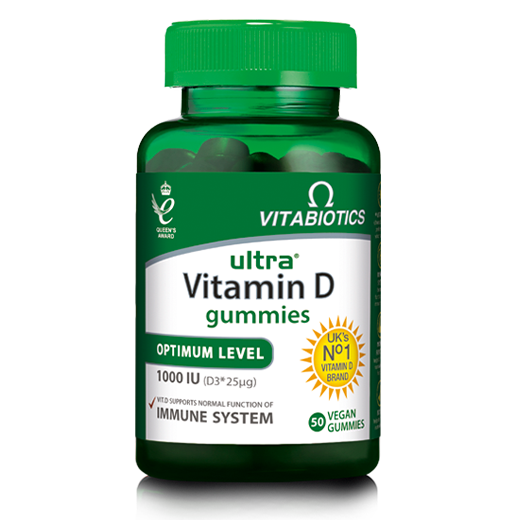Vitamin D is an essential nutrient needed by adults and children. There are several benefits of vitamin D, so knowing how much vitamin D you need each day as well as the sources of vitamin D is vital.
As vitamin D is such an important nutrient for our bodies to work properly, it’s important tht you have sufficient vitamin D in your diet.. A vitamin D supplement can help to safeguard your intake, especially during the darker autumn and winter months.
For all you need to know on vitamin D, from what vitamin D does, to vitamin D levels, look no further…
What is vitamin D?
Vitamin D is a fat soluble vitamin, which means it can be stored in the body for a long time. It’s often known as the ‘sunshine vitamin’ because we get the majority of our vitamin D we need from sunlight. This means that in the UK’s cooler months - typically October through to March - it can be harder to obtain the recommended amount of vitamin D.
The benefits of vitamin D, which we’ll detail shortly, do vary, from helping support our immune system, to maintaining normal muscle function.
What’s the difference between vitamin D and D3?
There are two types of vitamin D: vitamin D3 and vitamin D2.
The main difference between vitamin D and D3 is that vitamin D3 is a type of vitamin D. Vitamin D3 comes from animal sources and is the type that is made in our body when skin is exposed to sunlight.
Vitamin D2 comes from plants and fungi. The preferred type of vitamin D is vitamin D3 as our bodies can absorb and use vitamin D3 more effectively than vitamin D2.
When choosing the best vitamin D supplement, be sure that it contains vitamin D3.
What are the benefits of vitamin D?
Vitamin D provides some key benefits for the body.
Primarily, vitamin D helps to regulate the amount of calcium and phosphate in the body. These are two nutrients which help to keep bones, teeth and muscles healthy. Vitamin D contributes to normal blood calcium levels too.
Vitamin D has also been shown to play a role in contributing to the normal function of the immune system in both children and adults.
Can you have too much vitamin D?
Although you cannot get too much vitamin D from sunlight exposure, you can obtain too much vitamin D from supplements. Over a long period of time, too much vitamin D from supplements can cause too much calcium to build up in the body. which can weaken bones and cause damage to the kidneys and the heart.
If you choose to take vitamin D supplements, 10µg a day is enough for most people although many people look for higher levels of support. It’s recommended to not take more than 100µg of vitamin D a day as this could be harmful. The UK’s Department of Health and Social Care also states that Children aged 1 to 10 years should not have more than 50µg per day whilst infants under 12 months should not have more than 25µg a day.
Speak to your GP or a healthcare professional if you need further advice.
Sources of vitamin D
Unlike several other nutrients, there aren’t that many sources of vitamin D as the primary source is sunlight. When skin is exposed to sunlight, vitamin D3 is produced, which is the body’s preferred type of vitamin D.
In the UK, from about late March to the end of September, most people should be able to make all the vitamin D they need from sunlight as it is during this time that the sun is stronger and the UK has more daylight hours. However, between October and early March we do not make enough vitamin D from sunlight, so vitamin D supplements can be useful.
Vitamin D is also found in some foods, however there aren’t many vitamin D rich foods, which means sunlight is our main source of this nutrient. Some vitamin D food sources include oily fish such as sardines, mackerel and salmon, liver, egg yolks, red meat such as beef, mushrooms and fortified foods such as cereals and juice.
In saying this, an average UK diet provides 3 to 4 µg of vitamin D per day and only a little more if oily fish is consumed, so it’s important to get enough sunlight when possible, or safeguard your intake with a supplement.
Supporting vitamin D levels with supplements
A useful way to safeguard your levels of vitamin D, is by taking a supplement. Ideally, to reap the benefits of vitamin D, you’ll want a supplement that contains vitamin D3 as this is more easily absorbed by the body.
The UK’s Department of Health and Social Care advises adults and children over four, consider to take a daily vitamin D supplement containing 10µg of vitamin D during the UK winter months, when sun is scarce.
People at high risk of not getting enough vitamin D such as those who spend most of their time indoors, all children aged one to four, and all babies (unless they're having more than 500ml of infant formula a day) should take a daily supplement throughout the year.
For a supplement containing the exact level of vitamin D as recommended by the UK Department of Health and Social Care try Vitabiotics Ultra Vitamin D 400IU which provides 10μg of vitamin D3.
Vitabiotics Ultra Vitamin D 4000 IU provides the maximum adult dose of 100μg in each tablet in vitamin D3 form, however it is recommended for use under the guidance or supervision of your pharmacist or health professional.







